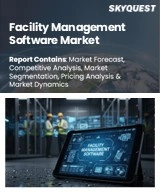
|
시장보고서
상품코드
1691655
일본의 시설 관리 시장 : 유형별, 모드별, 산업 유형별, 최종사용자별, 지역별, 기회 및 예측(2018-2032년)Japan Facility Management Market Assessment, By Type, By Mode, By Industry Type, By End-user, By Region, Opportunities, and Forecast, FY2018-FY2032F |
||||||
일본의 시설 관리 시장 규모는 비핵심 업무의 아웃소싱 추세 증가, 부동산 부문 확대 등 여러 요인으로 인해 2025-2032년 예측 기간 동안 7.16%의 CAGR로 2024년 532억 8,000만 달러에서 2032년 926억 2,000만 달러로 성장할 것으로 예상됩니다. 조직과 정부 기관은 유지보수, 보안, 청소 서비스를 포함한 종합적인 시설 관리 솔루션의 이점을 깨닫고 있으며, 친환경 실천을 촉진하는 안전 및 환경적 지속가능성에 대한 정부 규제에 힘입어 성장세를 보이고 있습니다. 인프라 지출의 증가는 특히 헬스케어, 소매, 제조 분야의 시장 성장에 기여하고 있습니다.
스마트 빌딩 기술은 실시간 모니터링과 예지보전을 가능하게 하는 스마트 빌딩 기술을 시설 관리에 접목하여 업무 효율을 변화시키고 있습니다. 기업이 소비자의 기대와 규제 요건의 변화에 적응함에 따라 종합적인 시설 관리 솔루션에 대한 수요는 계속 증가하고 있습니다. 도쿄와 오사카 등 대도시에서는 기술적으로 진보된 솔루션에 대한 수요가 증가하는 반면, 지방에서는 비용 효율적이고 필수적인 서비스에 대한 수요가 증가하고 있습니다. 경쟁 구도는 통합 시설 관리 솔루션을 제공하는 세계 기업들과 청소 및 보안 시스템과 같은 단일 서비스 솔루션에 집중하는 현지 기업들의 조합으로 구성됩니다. 이러한 다양성을 통해 특정 산업의 니즈에 맞는 시설 관리 솔루션을 제공할 수 있습니다. 또한, 일본의 지속적인 도시화 및 산업화 추세는 시설 관리 분야에서 혁신적 활용을 위한 더 많은 기회를 제공하고 있습니다. 기업들이 유지보수, 수리 및 기타 업무 효율화를 위해 서비스 포트폴리오를 다양화함에 따라 시장은 다양한 분야에서 성장할 가능성이 높습니다.
예를 들어, 2024년 10월 Colliers International Japan K.K.의 호텔 & 호스피탈리티 서비스 부문이 일본에서 영업을 시작할 예정이며, 지난 9월 Colliers는 성장하고 있는 일본 사업에서 새로운 서비스 제공을 위한 새로운 서비스 제공의 설립을 발표했습니다. 호텔 & 호스피탈리티 서비스 부문의 설립을 통해 Colliers는 일본에서 쌓아온 호텔 & 호스피탈리티 분야의 풍부한 실적과 노하우를 활용할 수 있게 되었습니다.
예를 들어, 2024년 10월 NTT DATA Corporation과 Workday, Inc.는 일본 기업에 첨단 인적자원관리(HCM) 솔루션을 제공하기 위한 전략적 서비스 파트너십을 체결했습니다. 이번 협력을 통해 Workday Human Capital Management를 활용한 컨설팅부터 도입까지 엔드투엔드 서비스가 제공될 예정입니다. 이번 협력은 인력 부족 문제를 해결하고, 인력 관리의 디지털 혁신을 촉진하기 위한 것입니다. 이번 파트너십은 기업 가치와 지속가능한 성장을 위한 인적자원 최적화에 초점을 맞추고 있습니다.
일본의 시설 관리 시장에 대해 조사했으며, 시장 개요와 함께 유형별, 모드별, 산업 유형별, 최종사용자별, 지역별 동향, 시장 진출 기업 프로파일 등의 정보를 전해드립니다.
목차
제1장 프로젝트 범위와 정의
제2장 조사 방법
제3장 주요 요약
제4장 고객의 소리
제5장 일본의 시설 관리 시장 전망, 2018-2032년
- 시장 규모 분석과 예측
- 시장 점유율 분석과 예측
- 시장 맵 분석, 2024년
- 유형별
- 모드별
- 산업 유형별
- 최종사용자별
- 지역별
제6장 Porter's Five Forces 분석
제7장 PESTLE 분석
제8장 시장 역학
제9장 시장 동향과 발전
제10장 사례 연구
제11장 경쟁 구도
- 시장 리더 탑 5 경쟁 매트릭스
- 진출 기업 탑 5 SWOT 분석
- 시장의 주요 기업 탑 10 상황
- FM System, Inc.
- CBRE K.K.
- Jones Lang LaSalle K.K.
- ISS Group
- Nippon Kanzai Holdings Co., Ltd.
- Compass Group Japan Inc.
- Globeship Sodexo Corporate Services K.K.
- Asahi Facilities Inc.
- Kanden Facilities Co., Ltd
- Cushman & Wakefield Asset Management K.K.
제12장 전략적 제안
제13장 조사 회사 소개 및 면책사항
ksm 25.04.07Japan facility management market is projected to witness a CAGR of 7.16% during the forecast period FY2025-FY2032, growing from USD 53.28 billion in FY2024 to USD 92.62 billion in FY2032 due to several factors including rising trend of outsourcing non-core operations and expansion in the real estate sector. Organizations and government institutions are realizing the benefits of integrated facility management solutions that involve maintenance, security, and cleaning services, fueled by government regulations related to safety and environmental sustainability that promote green practices. Increased infrastructure spending is also contributing to market growth, especially in healthcare, retail, and manufacturing.
Smart building technologies incorporated in facility management are changing the face of operational efficiency, allowing for real-time monitoring and predictive maintenance. As businesses adapt to changing consumer expectations and regulatory requirements, the demand for comprehensive facility management solutions continues to grow. The market also reflects regional dynamics, with urban centers such as Tokyo and Osaka driving demand for technologically advanced solutions while rural areas focus on cost-effective and essential services. The competitive landscape consists of a combination of global players that provide integrated facility management solutions and local players focusing on single-service solutions, such as cleaning and security systems. This diversity will allow for the provision of facility management solutions tailored to specific industry needs. Additionally, the continued urbanization and industrialization trends in Japan provide further opportunities for innovative applications within the facility management domain. As companies are diversifying their service portfolio in maintenance, repair, and other services efficiency in operations, the market is likely to grow across various sectors.
For instance, in October 2024, Colliers International Japan K.K.'s hotels & hospitality Services division commences operation in Japan. Colliers announced the establishment of a new service offering in its growing Japan business in September. With the establishment of the new Hotels & Hospitality Services team in Japan, Colliers leverage our extensive track record and know-how in the hotel and hospitality sector, cultivated in Japan.
For instance, in October 2024, NTT DATA Corporation and Workday, Inc. signed a strategic service partnership to deliver advanced Human Capital Management (HCM) solutions to Japanese enterprises. The collaboration will provide end-to-end services, from consulting to implementation, using Workday Human Capital Management. This initiative aims to address labor shortages and drive digital transformation in workforce management. The partnership focuses on optimizing human resources to enhance corporate value and sustainable growth.
Technological Developments Drive the Market
Technological developments and the advent of humanoid robots to provide facility management services in Japan profoundly impact the market. These robots are used in government institutions, including railways, as a part of this trend. These robots can paint, lift heavy objects, and quickly provide maintenance services that enhance operations' efficiency and safety through reduced human exposure to hazardous environments. With the labor force moving into decline, the adoption and incorporation of robotics fill the gap created by a dwindling workforce. This enables companies to maintain productivity while minimizing the impact of the declining employee count. The deployment of such technologies facilitates the efficient delivery of services while addressing the challenges brought by the elderly and aging population, hence making facility management more efficient and sustainable in the long term.
For instance, in June 2024, Sumitomo Mitsui Financial Group and Recruit signed an agreement to explore financial service collaboration through Recruit's "Air Business Tools." The partnership aims to enhance productivity for Japan's small and medium-sized enterprises amid a labor shortage. SMBC focuses on digital marketing and corporate solutions, while Recruit seeks to improve business efficiency. The collaboration will explore digital financial services to support SME growth.
Growth in Soft Services Drives the Market
The growth in soft services is driving the facility management market. These services include essential functions such as cleaning, security, catering, and waste management, which are increasingly in demand by organizations to enhance operational efficiency and occupant satisfaction. The growing focus on hygiene and safety, particularly in response to recent global health challenges, has increased demand for professional cleaning and sanitization services across various sectors. Moreover, the integration of technology, including IoT and analytics, is changing the way soft services are delivered, offering real-time monitoring and better decision-making. This is because as businesses continue outsourcing non-core functions to specialized providers, the segment of soft services is expected to expand further to solidify its pivotal role in shaping the future of facility management.
For instance, in January 2024, Skyline Robotics Ltd., developers of Ozmo, the world's first high-rise window-cleaning robot has been awarded a patent from Japan related to the automation of work and using robotic arms on a building's facade. As businesses realize the need to innovate products for facility performance and occupant comfort, soft services will continue to be a core part of the facility management industry, defining its future direction and operational standards.
Commercial Segment Dominates the Market
The commercial segment dominates the facility management market. This sector involves several establishments, such as offices, retail spaces, and healthcare facilities that require efficient management services. The increasing demand for well-maintained environments to boost productivity and ensure safety is driving this growth. As businesses are focusing on providing high-quality facility management to maintain their workspaces, commercial spaces have become sophisticated and require more advanced solutions. Moreover, increased urbanization and changing consumer needs in the retail and hospitality sectors also require effective facility management services. Thus, the commercial segment will continue to hold its ground in the future scenario of facility management services.
For instance, in December 2024, Hochiki and Ajira formed a business partnership to commercialize AI-driven security and facility management solutions. By integrating Hochiki's security systems with Ajira's behavioral recognition AI, the collaboration aims to enhance operational efficiency, reduce security costs, and address labor shortages in the security industry. This initiative will strengthen security offerings for commercial facilities and office buildings. Both companies see this partnership as a step toward expanding business opportunities in the growing smart security market.
Central Japan Acquires the Highest Market Share
Central Japan holds the major market share of facility management activities, with growing infrastructural development and an increasing paradigm shift towards outsourcing non-core business operations. In addition, considerable investments in commercial real estate in this region, with office buildings and retail spaces meeting the demands of the expanding urban population. Furthermore, the booming industries in Central Japan - including manufacturing and technology require effective and all-encompassing facility management solutions to maintain operational efficiency. To cater to the demands of companies, new offices officially opened in Tokyo's Shibuya business district, reflecting a strategic move to meet the increasing demand for sustainable information technology solutions.
For instance, in December 2024, ALSOK completed the acquisition of Osaka-based building management company Kanso, strengthening its facility management (FM) business. The company acquired 100% of Kanso's shares from H2O Commercial Development as part of its M&A strategy. This move expanded ALSOK's FM operations in the Kansai region, following its 2022 investments in three other firms.
Future Market Scenario (FY2025 - FY2032F)
The Japan facility management market will increasingly incorporate smart technologies, enhancing operational efficiency and predictive maintenance. This shift will enable real-time monitoring and data-driven decision-making across various facilities.
Growing environmental awareness will drive demand for sustainable facility management practices. Companies will prioritize green initiatives, aligning with government regulations aimed at reducing carbon footprints and promoting energy efficiency.
The trend of outsourcing non-core operations is expected to gain momentum, allowing businesses to focus on their core competencies. This will create opportunities for facility management providers to offer integrated solutions that streamline services and reduce costs.
The commercial real estate sector will continue to thrive, leading to increased demand for comprehensive facility management services. As infrastructure development accelerates, facility managers will play a crucial role in optimizing operations within hotels, retail spaces, and office buildings.
Key Players Landscape and Outlook
The competitive landscape of the Japan facility management market is characterized by high fragmentation, with numerous players of varying sizes actively participating. Major international vendors offer integrated solutions, while local companies often focus on single-service contracts. This diversity fosters a dynamic environment where companies engage in mergers, acquisitions, and partnerships to enhance their service offerings and address market challenges. Notable players are leveraging technology and innovation to improve service delivery. The shift towards integrated facilities management is a key trend, as organizations seek streamlined operations and enhanced efficiency. Additionally, the increasing emphasis on sustainability and compliance with safety regulations further shapes competitive strategies within the market.
For instance, in March 2023, CBRE K.K. announced a partnership with INSPACE, an Australian PropTech company specializing in digital twins, 3D stacks, and 360-degree virtual tours of real estate properties. CBRE's newly formed PropTech Solutions business unit provides innovative solutions for the real estate industry.
Table of Contents
1. Project Scope and Definitions
2. Research Methodology
3. Executive Summary
4. Voice of Customer
- 4.1. Service and Market Intelligence
- 4.2. Brand Awareness
- 4.3. Factors Considered in Purchase Decisions
- 4.3.1. Features and Other Value-Added Service
- 4.3.2. Service Quality
- 4.3.3. Service Scope
- 4.3.4. Technology and Innovation
- 4.3.5. Customer Support
- 4.3.6. Scalability
- 4.3.7. Flexibility
- 4.4. Unmet Needs
5. Japan Facility Management Market Outlook, FY2018-FY2032F
- 5.1. Market Size Analysis & Forecast
- 5.1.1. By Value
- 5.2. Market Share Analysis & Forecast
- 5.2.1. By Type
- 5.2.1.1. Hard Service
- 5.2.1.1.1. Plumbing
- 5.2.1.1.2. Electrical Works
- 5.2.1.1.3. Maintenance and Repair
- 5.2.1.1.4. Others
- 5.2.1.2. Soft Service
- 5.2.1.2.1. Security and Safety
- 5.2.1.2.2. Cleaning
- 5.2.1.2.3. Waste Removal
- 5.2.1.2.4. Others
- 5.2.1.1. Hard Service
- 5.2.2. By Mode
- 5.2.2.1. Single
- 5.2.2.2. Integrated
- 5.2.3. By Industry Type
- 5.2.3.1. Organized
- 5.2.3.2. Unorganized
- 5.2.4. By End-user
- 5.2.4.1. Commercial
- 5.2.4.2. Residential
- 5.2.4.3. Industrial
- 5.2.4.4. Public
- 5.2.5. By Region
- 5.2.5.1. North [Hokkaido and Tohoku]
- 5.2.5.2. Central [Kanto and Chubu]
- 5.2.5.3. South [Kansai, Chugoku, Shikoku, and Kyushu & Okinawa]
- 5.2.6. By Company Market Share Analysis (Top 5 Companies and Others - By Value, FY2024)
- 5.2.1. By Type
- 5.3. Market Map Analysis, FY2024
- 5.3.1. By Type
- 5.3.2. By Mode
- 5.3.3. By Industry Type
- 5.3.4. By End-user
- 5.3.5. By Region
6. Porter's Five Forces Analysis
7. PESTLE Analysis
8. Market Dynamics
- 8.1. Market Drivers
- 8.2. Market Challenges
9. Market Trends and Developments
10. Case Studies
11. Competitive Landscape
- 11.1. Competition Matrix of Top 5 Market Leaders
- 11.2. SWOT Analysis for Top 5 Players
- 11.3. Key Players Landscape for Top 10 Market Players
- 11.3.1. FM System, Inc.
- 11.3.1.1. Company Details
- 11.3.1.2. Key Management Personnel
- 11.3.1.3. Products and Services
- 11.3.1.4. Financials (As Reported)
- 11.3.1.5. Key Market Focus and Geographical Presence
- 11.3.1.6. Recent Developments/Collaborations/Partnerships/Mergers and Acquisition
- 11.3.2. CBRE K.K.
- 11.3.3. Jones Lang LaSalle K.K.
- 11.3.4. ISS Group
- 11.3.5. Nippon Kanzai Holdings Co., Ltd.
- 11.3.6. Compass Group Japan Inc.
- 11.3.7. Globeship Sodexo Corporate Services K.K.
- 11.3.8. Asahi Facilities Inc.
- 11.3.9. Kanden Facilities Co., Ltd
- 11.3.10. Cushman & Wakefield Asset Management K.K.
- 11.3.1. FM System, Inc.
Companies mentioned above DO NOT hold any order as per market share and can be changed as per information available during research work.



















